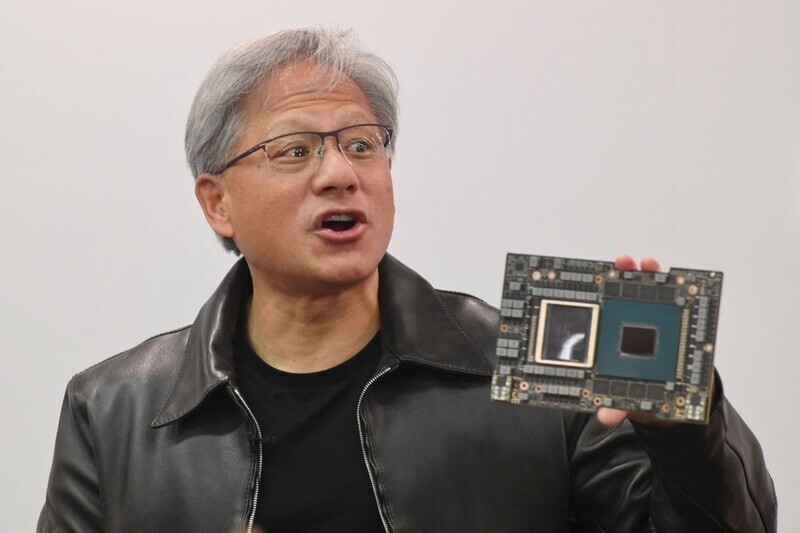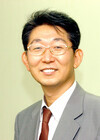hankyoreh
Links to other country sites 다른 나라 사이트 링크
[Column] Where are Korea’s Elon Musks and Jensen Huangs?


By Kwack Jung-soo, senior staff writer at the Hankyoreh Economy & Society Research Institute
The CEOs of leading companies in the US have recently stood up to US President Joe Biden’s policy of containment against China.
Jensen Huang, CEO of chipmaker Nvidia and the darling of the era of generative artificial intelligence chatbots like ChatGPT, launched a broadside against Biden’s China policy in a recent press interview, remarking that restrictions on semiconductor exports to China had left Nvidia with “our hands tied behind our back.”
Elon Musk, CEO of Tesla, the world’s leading electric vehicle manufacturer, remarked during a visit to China that he opposes decoupling between the US and China.
There’s also considerable discontent among South Korea companies about how the Yoon Suk-yeol administration has been fawning over the US and Japan and provoking China and Russia. In off-the-record conversations, businesspeople lament that Yoon’s policies aren’t benefiting the national economy or company operations.
Some have even candidly suggested that it would be better for Yoon to just sit on his hands until his presidency is over.
But the face these businesspeople present to the Korean public is something else altogether. The same people who gripe about the government in private are constantly praising and supporting it in public. Their two-faced behavior is frankly astonishing.
Korea’s six main business lobby groups published advertisements in support of Yoon’s much-debated visits to Japan and the US. One advertisement said the groups “support [Yoon’s] bold decision for the future of Korea-Japan relations,” and the other said the groups “welcome the achievements of President Yoon’s state visit to the US.”
On the first anniversary of Yoon’s inauguration, the Korea Federation of Small and Medium Businesses reported that 85% of small and medium-sized enterprises approve of Yoon’s efforts to strengthen economic cooperation with the US and Japan.
Samsung Electronics Chairperson Lee Jae-yong was exuberant in his praise of Yoon’s “third-party repayment” plan for the victims of forced labor during the Japanese colonial period, describing it as a “bold decision for the Korean people and the future of our country.”
Seeing these businesspeople applaud Yoon to his face and mock him behind his back reminds me of the fairy tale “The Emperor’s New Clothes.”
Korean businesspeople remember the dark times when there were grim consequences for making comments that irritated the government. And the prosecution service’s current control of the levers of power has had a chilling effect on businessperson, who feel vulnerable to targeted investigations by the prosecutors.
That’s basically what happened to KT, which was bombarded by investigations after the telecom got on Yoon’s bad side.
While businesspeople are obliged to consider their company’s interest, the national interest should come first when the two collide. But when government policy is of dubious value or is clearly misguided, staying quiet out of concern for one’s personal comfort suggests a cowardly disregard of one’s responsibility as a businessperson.
The strategic interests of the Korean economy are fairly clear. China has long played a crucial role, serving as Korea’s biggest export market. Abandoning the Chinese market is inconceivable.
Samsung and SK, which have both built large semiconductor plants in China, rely on their Chinese operations for 20%-40% of their output. While they need to lower their reliance on China in the medium and long term, they have to act prudently to avoid an economic shock.
Korea has a lot to learn from Europe, which exhibited strategic flexibility in the Group of Seven summit by calling for “de-risking,” or reducing risk, rather than “decoupling,” or a complete rupture with China.
The bravado the Yoon administration has displayed in imitation of the US and Japan’s hardline stance against China is very likely to damage the Korean economy. We shouldn’t expect the US or Japan to look after Korea’s national interest or for China to understand Korea’s predicament.
When China banned purchases of products from Micron Technology, a US-based memory chipmaker, the US pressured Korean companies not to fill the gap left by Micron. China has also been overtly warning Korea not to side with the US.
Korea is facing the specter of a repeat of the THAAD debacle. Japan hopes to exploit the strategic competition between the US and China to regain its former glory in the semiconductor sector.
Korea is in desperate need of the skill to navigate between the Scylla of US pressure to adopt its restrictions on China and the Charybdis of Chinese retaliation, as well as the wisdom to fend off Japan while preserving our current advantages.
In the end, the economy will be a key factor in the general election in 2024. Korea’s projected economic growth rate for the year keeps being revised downward, exports are still in a slump, and the trade deficit is piling up. High prices, high interest rates, and high unemployment are causing pain not only for the low-income class but also for the middle class.
But the Yoon administration is worsening inequality by clinging to the economic nonstarter of lowering taxes on the rich, slashing welfare for the disadvantaged, and turning the screws of fiscal austerity.
Minister of Economy and Finance Choo Kyung-ho recently boasted that the Korean economy will rebound in the second half of the year, but nobody in the business community believes that.
And as if that weren’t enough, there’s the peril of the Yoon administration’s national security policy and foreign policy. While it’s unclear if those policies will actually serve the safety of the Korean state and people, they’re likely to be more bad news for the Korean economy.
One of the key objectives of national security policy and foreign policy is to protect the economy, which is directly connected to the development and prosperity of the state. In the end, the US’ containment policy against China is itself designed to protect America’s economic hegemony.
The business community has recently been predicting, somewhat hopefully, that the Yoon administration will explore a new approach since continuing economic troubles would put the ruling party at a serious disadvantage in the general elections next year.
It would indeed be fortunate if the Yoon administration would stop kowtowing to the US and Japan and return to a proper balance. But it’s never easy for the emperor to admit he’s not wearing any clothes.
The Korean economy can’t afford to wait around forever. It’s time for businesspeople to speak the truth.
Is it really too much to expect Korean businesspeople to have the courage and conviction of the likes of Huang and Musk?
Please direct questions or comments to [english@hani.co.kr]

Editorial・opinion
![[Editorial] Intensifying US-China rivalry means Seoul must address uncertainty with Beijing sooner than later [Editorial] Intensifying US-China rivalry means Seoul must address uncertainty with Beijing sooner than later](https://flexible.img.hani.co.kr/flexible/normal/500/300/imgdb/original/2024/0517/8117159322045222.jpg) [Editorial] Intensifying US-China rivalry means Seoul must address uncertainty with Beijing sooner than later
[Editorial] Intensifying US-China rivalry means Seoul must address uncertainty with Beijing sooner than later![[Column] When ‘fairness’ means hate and violence [Column] When ‘fairness’ means hate and violence](https://flexible.img.hani.co.kr/flexible/normal/500/300/imgdb/original/2024/0516/7417158465908824.jpg) [Column] When ‘fairness’ means hate and violence
[Column] When ‘fairness’ means hate and violence- [Editorial] Yoon must stop abusing authority to shield himself from investigation
- [Column] US troop withdrawal from Korea could be the Acheson Line all over
- [Column] How to win back readers who’ve turned to YouTube for news
- [Column] Welcome to the president’s pity party
- [Editorial] Korea must respond firmly to Japan’s attempt to usurp Line
- [Editorial] Transfers of prosecutors investigating Korea’s first lady send chilling message
- [Column] Will Seoul’s ties with Moscow really recover on their own?
- [Column] Samsung’s ‘lost decade’ and Lee Jae-yong’s mismatched chopsticks
Most viewed articles
- 1[Editorial] Transfers of prosecutors investigating Korea’s first lady send chilling message
- 2For new generation of Chinese artists, discontent is disobedience
- 3S. Korea “monitoring developments” after report of secret Chinese police station in Seoul
- 4Xi, Putin ‘oppose acts of military intimidation’ against N. Korea by US in joint statement
- 5[Exclusive] Unearthed memo suggests Gwangju Uprising missing may have been cremated
- 6N. Korean media upgrades epithet for leader’s daughter from “beloved” to “respected”
- 7Yoon says concern about biased diplomacy is being incited by “communist totalitarian forces”
- 8[Editorial] Intensifying US-China rivalry means Seoul must address uncertainty with Beijing sooner t
- 9[Column] Samsung’s ‘lost decade’ and Lee Jae-yong’s mismatched chopsticks
- 10[Special reportage- part I] Elderly prostitution at Jongmyo Park